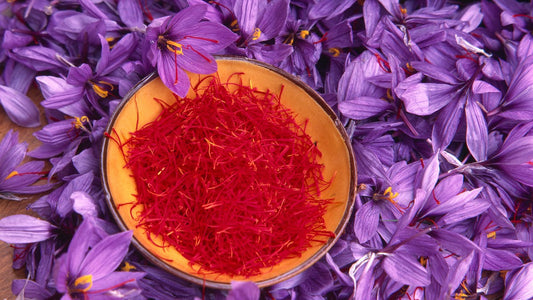
The Role of Saffron in Ayurveda
Ara OhanianShare
Saffron, often referred to as “red gold,” has been cherished for centuries not only for its culinary uses but also for its significant role in traditional medicine systems such as Ayurveda. This exquisite spice, derived from the flower of Crocus sativus, holds a prominent place in Ayurvedic medicine due to its potent health benefits and therapeutic properties.
Historical Significance of Saffron in Ayurveda
Ayurveda, the ancient Indian system of medicine, emphasizes the balance of body, mind, and spirit to achieve optimal health. Saffron, known as “Kumkuma” in Sanskrit, has been used in Ayurveda for over 3,000 years. Its vibrant color, distinct aroma, and medicinal properties have made it a staple in various Ayurvedic formulations.
Historically, saffron was reserved for the elite due to its rarity and high cost. It was used in rituals and as an offering to deities, signifying purity and prosperity. The ancient texts of Ayurveda, such as the Charaka Samhita and Sushruta Samhita, extol the virtues of saffron, highlighting its ability to enhance vitality, improve complexion, and balance the doshas.
Ayurvedic Properties of Saffron
In Ayurveda, saffron is classified as “Tridoshic,” meaning it can balance all three doshas: Vata, Pitta, and Kapha. This unique property makes saffron a versatile remedy for various health issues.
1. Vata Dosha: Saffron helps in calming the nervous system and alleviates symptoms associated with Vata imbalance, such as anxiety, insomnia, and digestive issues. Its warming properties make it particularly beneficial during cold and dry seasons.
2. Pitta Dosha: Saffron’s cooling effect helps pacify Pitta dosha, reducing inflammation and heat-related conditions. It is often used to treat skin disorders, improve liver function, and enhance vision.
3. Kapha Dosha: Saffron aids in balancing Kapha dosha by promoting circulation and metabolism. It helps in managing respiratory conditions, reducing mucus, and detoxifying the body.
Health Benefits of Saffron in Ayurvedic Medicine
1. Enhances Mood and Fights Depression
Saffron is renowned for its mood-enhancing properties. It contains compounds like crocin and safranal, which have antidepressant effects. In Ayurveda, saffron is used to treat conditions like depression, anxiety, and mood swings. Its natural sedative properties help calm the mind and promote restful sleep.
2. Improves Digestive Health
Saffron stimulates digestive enzymes, aiding in better digestion and absorption of nutrients. It is used to treat digestive disorders such as bloating, gas, and indigestion. Saffron’s carminative properties help in relieving flatulence and soothing the gastrointestinal tract.
3. Boosts Immunity
Saffron is rich in antioxidants, which protect the body from free radical damage and strengthen the immune system. In Ayurveda, saffron is used in formulations to boost immunity, fight infections, and promote overall health and well-being.
4. Enhances Skin Health
Saffron’s anti-inflammatory and antibacterial properties make it a valuable ingredient in Ayurvedic skincare. It is used to treat acne, blemishes, and skin infections. Saffron also improves complexion, giving the skin a natural glow. It is often used in face masks and creams to enhance skin texture and tone.
5. Supports Cardiovascular Health
Saffron helps in maintaining healthy cholesterol levels and improves blood circulation. Its antioxidant properties protect the heart from oxidative stress and reduce the risk of cardiovascular diseases. In Ayurveda, saffron is used to strengthen the heart and improve overall cardiovascular health.
6. Improves Respiratory Health
Saffron is beneficial in treating respiratory conditions such as asthma, bronchitis, and cough. Its expectorant properties help in clearing mucus from the respiratory tract, making breathing easier. Saffron is often used in Ayurvedic formulations to support respiratory health and alleviate symptoms of colds and flu.
Ayurvedic Formulations with Saffron
1. Chyawanprash: A traditional Ayurvedic jam made with a blend of herbs, spices, and saffron. It is used to boost immunity, enhance vitality, and promote overall health.
2. Kumkumaadi Tailam: An Ayurvedic facial oil containing saffron and other herbs. It is used to improve skin complexion, reduce blemishes, and provide a natural glow.
3. Shatavari Kalpa: A rejuvenating Ayurvedic tonic made with saffron and Shatavari. It is used to support women’s health, improve fertility, and enhance vitality.
Incorporating Saffron into Your Daily Routine
1. Saffron Milk: Add a few strands of saffron to a glass of warm milk. This traditional drink, known as “Kesar Doodh,” is consumed to improve digestion, enhance mood, and promote restful sleep.
2. Saffron Water: Soak a few strands of saffron in water overnight and drink it in the morning. This simple yet effective remedy helps in detoxifying the body, improving digestion, and enhancing skin health.
3. Saffron Tea: Brew saffron strands with tea leaves and other herbs to make a refreshing and health-boosting tea. Saffron tea is known for its antioxidant properties and helps in boosting immunity.
Conclusion
Saffron, with its myriad of health benefits and therapeutic properties, holds a special place in Ayurveda. Its ability to balance the doshas and promote overall health makes it a valuable addition to your daily routine. Whether consumed in food, taken as a supplement, or used in skincare, saffron can significantly enhance your well-being.
By incorporating saffron into your Ayurvedic practices, you can harness the power of this golden spice to achieve optimal health and vitality. Embrace the wisdom of Ayurveda and let saffron be a part of your journey towards a balanced and healthy life.
FAQ for The Role of Saffron in Ayurveda
What is saffron’s role in Ayurveda? Saffron, known as “Kumkuma” in Sanskrit, is used in Ayurveda for its balancing properties across all three doshas (Vata, Pitta, Kapha). It has been utilized for over 3,000 years for its therapeutic benefits.
How does saffron help balance the doshas? Saffron helps calm the nervous system (Vata), reduces inflammation (Pitta), and promotes circulation and metabolism (Kapha).
What are the health benefits of saffron in Ayurvedic medicine? Saffron enhances mood, improves digestion, boosts immunity, supports cardiovascular and respiratory health, and improves skin health.
How can saffron be incorporated into daily routines? You can add saffron to warm milk, water, or tea. It is also used in Ayurvedic formulations like Chyawanprash and Kumkumaadi Tailam.
Are there specific Ayurvedic formulations that include saffron? Yes, some include Chyawanprash, Kumkumaadi Tailam, and Shatavari Kalpa, each providing various health benefits.
How does saffron improve mood and fight depression? Saffron contains compounds like crocin and safranal, which have natural antidepressant effects, calming the mind and promoting restful sleep.
Can saffron help with digestive health? Yes, saffron stimulates digestive enzymes and has carminative properties, aiding in better digestion and relieving flatulence.
What are the benefits of saffron for the skin? Saffron’s anti-inflammatory and antibacterial properties treat acne, improve complexion, and enhance skin texture and tone.
How does saffron support cardiovascular health? Saffron helps maintain healthy cholesterol levels, improves blood circulation, and protects the heart from oxidative stress.
What respiratory benefits does saffron offer? Saffron’s expectorant properties clear mucus, making it beneficial for conditions like asthma, bronchitis, and coughs.
What traditional drinks or remedies can be made with saffron? Traditional drinks include saffron milk (Kesar Doodh) and saffron water, which are consumed for their digestive and detoxifying benefits.
How is saffron used in skincare according to Ayurveda? Saffron is used in face masks and creams to enhance skin health, reduce blemishes, and provide a natural glow.




